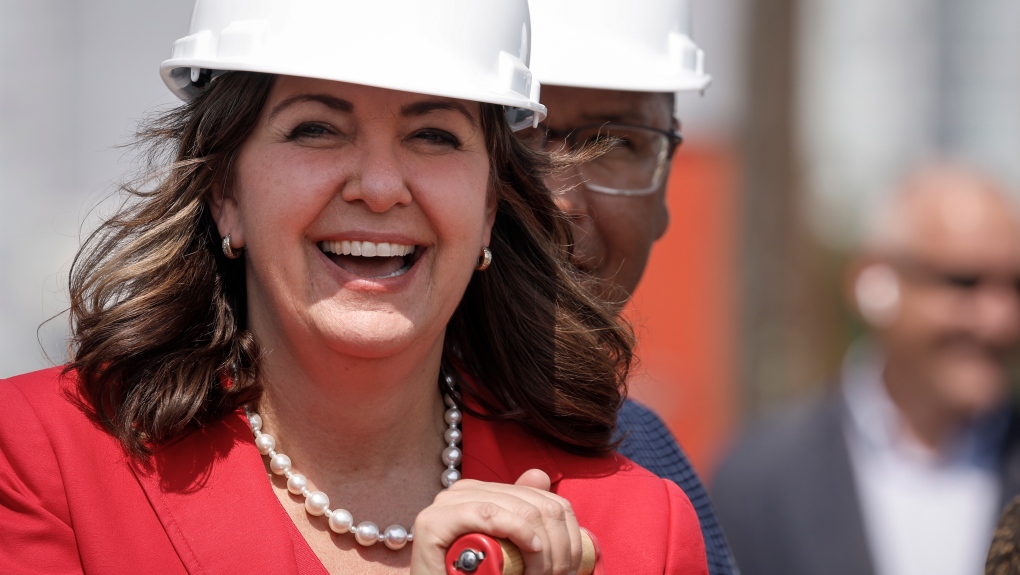Premier has less to fear from November leadership vote than slipping support in Calgary
At the start of November, United Conservative Party members will gather in Red Deer for their annual general meeting, which will include a vote on Danielle Smith’s leadership.
The summer “BBQ circuit” scuttlebutt among the chattering class in Alberta has raised questions about how the premier will fare in November’s vote, speculating she is “moving right” on some issues to avoid a putsch by the more radical elements of her party.
And over the past few months, there has been an effort by some conservative activists to press Smith to embrace less-than-mainstream positions on issues like vaccines, gun ownership, provincial pensions and police forces and alike.
Here is some free advice for the premier: don’t bite.
You have little to fear from November’s vote, and efforts to appease more radical (and mainly rural) segments of the UCP may further erode your support in Calgary.
Here are some numbers to support this advice:
First, Smith currently has an approval rating of 85 per cent among those who voted UCP in the last provincial election.
Eighty-five per cent!
That’s according to ThinkHQ syndicated polling conducted provincewide in August.
Barring a ferocious distortion of AGM attendees versus UCP voters, Smith’s leadership vote is a foregone and affirmative conclusion.
For context, when Jason Kenney quit as UCP leader with only 51 per cent in a similar party member vote, he enjoyed approval from only 56 per cent of UCP voters writ-large.
Secondly, UCP support in Calgary is slowly eroding, according to our polling.
Presently, the NDP holds a nine-point lead over the UCP within Calgary city limits, 53 per cent versus 44 per cent of the decided vote.
In other words, the UCP is down four points since the election and the NDP is up four points.
 Alberta Premier Danielle Smith leans on a shovel as she prepares to turn the sod on the new Calgary Flames arena in Calgary, Alta., Monday, July 22, 2024. THE CANADIAN PRESS/Jeff McIntosh
Alberta Premier Danielle Smith leans on a shovel as she prepares to turn the sod on the new Calgary Flames arena in Calgary, Alta., Monday, July 22, 2024. THE CANADIAN PRESS/Jeff McIntosh
Policies opposed to vaccines, favouring gun rights and provincial expansion into policing and pensions, among other things, may play well in more rural areas of the province and among the “Take Back Alberta” crowd but they tend to receive the opposite reception in Alberta’s largest city.
For Smith, tilting right to avoid a phantom challenge to her leadership at November’s UCP AGM may create stronger headwinds for her in 2027’s provincial election in Calgary.
That may seem like a long time off – three years – but if the 2023 election is any guide, Smith will want to garner any advantage she can in Cowtown.
In 2023, the UCP nearly “ran the table” outside the two major cities but ended with only a five-seat majority in the legislature (a razor-thin majority by Alberta standards).
They captured no seats in Edmonton and only 12 seats in Calgary (while the NDP got 14).
Moreover, UCP victories outside the two major cities tended to be landslides, with the average margin of victory for UCP candidates ~40 points ahead of second place.
By comparison, Calgary, in 2023’s provincial election, was highly competitive with 12 of the 26 ridings inside the city decided by a margin of five points or less.
Five of those close ridings were won by UCP candidates: Bow, Cross, East, North and Northwest.
A five- or six-point shift against the UCP in vote in Calgary’s share in the next election could very well be the difference between forming a government or not.
That is the UCP’s ever-present risk.
The same is true for the NDP, as their candidates won seven of those close ridings.
 Alberta Premier Danielle Smith meets supporters at the annual Premier’s Stampede breakfast in Calgary, Alta., Monday, July 8, 2024. THE CANADIAN PRESS/Jeff McIntosh
Alberta Premier Danielle Smith meets supporters at the annual Premier’s Stampede breakfast in Calgary, Alta., Monday, July 8, 2024. THE CANADIAN PRESS/Jeff McIntosh
A five- or six-point shift against the NDP in favour of the UCP could cost them Acadia, Beddington, Edgemont, Elbow, Foothills, Glenmore and Klein.
The other wrinkle in these calculations is the changing of the guard in the Opposition – Naheed Nenshi, the former mayor of Calgary, now leads the NDP.
Shortly after the 2013 flood in Calgary, Nenshi was a political “rock star” with very high approval ratings among his voters.
At this stage, though, he is more of a faded rock star.
Our polling shows he currently sits at 43 per cent approval provincewide, tied with Smith, though the premier’s disapproval is higher.
Nenshi is a good surrogate for Rachel Notley, with the two sharing many of the same demographic variances in support – higher among women, younger and urban voters, etc.
His approval in Calgary is good, though not like it used to be, but he’s still more popular than the premier in his hometown.
Although Nenshi has some miles on him, he is still a very capable politician, particularly when armed with a good issue.
Make no mistake; many of the more radical issues being proffered to the premier for support prior to the leadership vote are very good issues for Nenshi.
Anti-vaxxing, gun rights, trans policy, etc.
In Calgary, you may as well be handing Nenshi a stick to hit you with.
In many ways, events leading up to Smith’s November leadership vote will be far more interesting than the results.
View original article here Source









